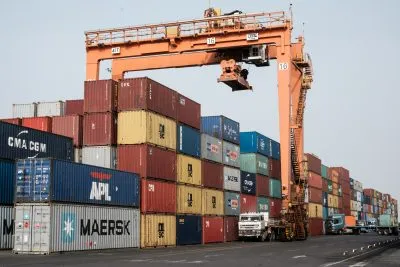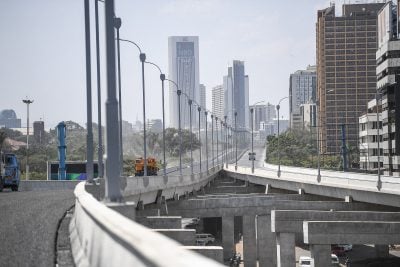The current slump in the price of oil in the global market has forced the Nigerian government to announce austerity measures aimed at cushioning its impact on the economy. But analysts say the government should have anticipated this long ago and put in place appropriate strategies, writes Frederick Mordi.
The word ‘austerity,’ first crept into the Nigerian lexicon in the 1980s, when the government introduced belt-tightening measures in response to the sharp drop in the price of oil – the nation’s main source of revenue – and rising foreign debt.

The austerity regime caused the ordinary Nigerian no small hardship. Food items such as rice, milk and sugar gradually disappeared from the tables of many homes. This followed an import ban announced by the government, as part of the programme. Many Nigerians who were born then would not forget the experience in a hurry. The current slump in the price of oil, which fell from $115 per barrel in June to less than $70 in December 2014, has put austerity back on the agenda.
Petroleum exports make up around 90% of Nigeria’s total export earnings, and the government has had to revise the $78 per barrel benchmark that it included in the 2015 budget down to $73 per barrel.
The World Bank had earlier warned Nigeria of its vulnerability to an oil price shock as prices dropped. Other oil exporting nations, including Iraq, Iran and Venezuela have all suffered from a crisis that has at its root a progressive slump in demand from the US, which has dramatically reduced its imports of oil following a ramp-up of domestic shale gas production. Nigeria’s Minister of Finance and Coordinating Minister of the Economy, Ngozi Okonjo-Iweala, who unveiled the new austerity programme in November, appealed to Nigerians to tighten their belts, while government keeps an eye on global oil price movements.
However, unlike previous austerity measures that hurt the poor, this time, they are essentially targeted at the rich and government officials. Wealthy Nigerians will now pay tax on luxury goods such as private jets, yachts, champagne, expensive cars and alcoholic beverages.
She said: “The drop in oil prices is a serious challenge which we must confront as a country. We must be prepared to make sacrifices where necessary.”
Part of this strategy might include trimming some ministries, departments and agencies, and the merger of others that perform similar roles. In addition, the Minister announced a cut on government spending on international travel by public officials.
The plan would require the assent of the National Assembly before it takes effect, although lawmakers are now preoccupied with the February 2015 general elections. In an election year when spending is usually high, analysts say it may be difficult for the government to fully implement the austerity measures.
Reducing the impact
Okonjo-Iweala said the government would consider introducing additional measures should oil prices continue to drop. However, she assured that the government would take steps that would insulate the ordinary Nigerian against the impact. Admitting that the fall in oil price poses some challenges for the economy, nevertheless, she believes it is an opportunity to pay closer attention to the non-oil sector, which has been largely neglected.
She added: “In the ’80s, when we had shock, we didn’t take measures by ourselves to adjust. We waited for others to come and tell us how to adjust. But now, we have competent teams and our job is not to sit and wait, but to craft a set of policies that will help us to address the shocks.

“It is important that our strategies are based on facts and a clear understanding of both the strengths of the economy and the challenges posed by the drop in oil prices. Our strategy is to continue to strengthen the sectors that drive growth, such as agriculture and housing, while reducing waste with a renewed focus on prudence.”
Reactions have continued to trail the austerity regime. Some stakeholders believe that current developments in the global oil market call for urgent action to prevent systemic distress in the economy. While they welcomed the luxury tax on the rich in Nigeria, they doubt if the policy will be effective, as it is generally believed that the rich usually find a way to avoid paying taxes.
The Lagos Chamber of Commerce and Industry (LCCI), has expressed fears that the austerity measures could impact negatively on businesses in the country, due to the envisaged increase in the cost of production. The LCCI, in a statement by its president, Remi Bello, said: “Many firms are already feeling the heat across all sectors. In the past few weeks, [the] naira exchange rate has depreciated by about 11% in the interbank market and over 12% in the parallel market. The impact of the depreciation on operating costs is very profound.”
The LCCI joined the clamour for economic diversification as a more sustainable solution to the crisis. “An economy that is diversified has a better capacity to withstand shocks,” Bello said. “At every turn in our advocacy activities, we have canvassed the need for the creation of an enabling environment to enhance the productivity of enterprises and consequently ensure economic diversification.”
Francis Johnson, the president of the Petroleum and Natural Gas Senior Staff Association of Nigeria (PENGASSAN), a key stakeholder in the nation’s oil and gas industry, decried public sector waste, saying: “The huge number of political appointees as aides to the president, the ministers, state governors and their commissioners, is simply wasting national resources and putting pressure on the economy.
“If we are looking for ways to cut cost, the first place to focus on is in the direction of reducing the number of Presidential aides from 133 to the barest minimum of about 20. The huge amount we spend in paying these aides can be used on developmental projects and boosting the nation’s economy.”
The CBN intervenes
The Central Bank of Nigeria has intervened to try to cushion the blow of falling oil prices. At its meeting held in November 2014 in Abuja, the CBN’s Monetary Policy Committee (MPC) agreed to devalue the naira from N155 to the US dollar, to N168. The fall in the value of the naira invariably means that the cost of living will go up as Nigeria is an import-dependent economy.
The CBN governor, Godwin Emefiele, explained that naira devaluation would help strengthen the local currency, which had grown increasingly weaker. Falling oil prices have reduced the accretion to external reserves, thus constraining the ability of the central bank to defend the naira and sustain the stability of the naira exchange rate, he explained. The central bank also raised interest rates to 13%, from 12%.
Emefiele said: “The current situation demands that the bank confronts the issue of declining external reserves head on, in order to strengthen the value of the domestic currency. Consequently, stabilising prices and maintaining exchange rate stability and charting a sustainable path for medium- to long-term growth are the immediate top priorities.
“But I think that with the austerity measures being unfolded, together with the support coming from the monetary authority, the CBN, we will work together see how the effect of this tightening measures does not get too hard on the economy.”
Noting that the government has already taken a couple of measures, Emefiele said nothing was too much to keep the economy running. He also stressed the need for diversification of the economy as a long-term solution to the episodic oil crisis that Nigeria faces.
He added: “At this point, we don’t have a choice any more. We must embrace import substitution before we talk about export-oriented industrialisation. We must move away from importing these goods that are putting pressure on our reserves. If we do this, our reserves will get stronger.”
Want to continue reading? Subscribe today.
You've read all your free articles for this month! Subscribe now to enjoy full access to our content.
Digital Monthly
£8.00 / month
Receive full unlimited access to our articles, opinions, podcasts and more.
Digital Yearly
£70.00 / year
Our best value offer - save £26 and gain access to all of our digital content for an entire year!
 Sign in with Google
Sign in with Google 



